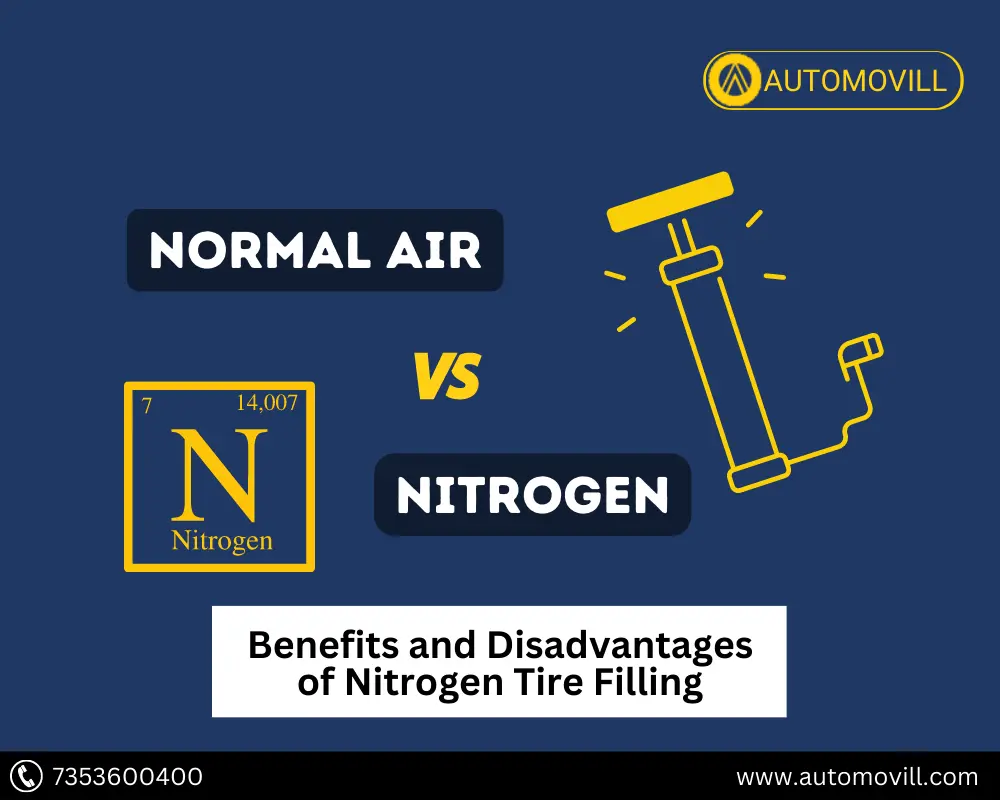
Tires are an essential component of a vehicle, and their proper maintenance is crucial for the safety and performance of the vehicle. One of the maintenance activities for tires is inflating them with the appropriate air pressure.
While normal air is commonly used for tire inflation, nitrogen tire filling is gaining popularity. In this article, we will discuss the benefits and disadvantages of nitrogen tire filling compared to normal air.
Normal air, which is a mixture of approximately 78% nitrogen, 21% oxygen, and 1% other gases, has been the traditional choice for tire inflation.
However, the use of pure nitrogen is becoming more common for tire filling. Nitrogen tire filling involves replacing the normal air in a tire with pure nitrogen gas, which is dry and free from moisture, oil, and other impurities.
Benefits of Nitrogen Tire Filling
- Increased Tire Life
One of the main benefits of nitrogen tire filling is that it can extend the life of a tire. Nitrogen is a larger molecule than oxygen and other gases present in normal air, and it does not escape through the rubber of the tire as easily as oxygen does. This means that the tire pressure remains more consistent over time, which can reduce wear and tear on the tire.
- Improved Fuel Efficiency
Another benefit of nitrogen tire filling is that it can improve fuel efficiency. When a tire is underinflated, it creates more rolling resistance, which increases fuel consumption. Nitrogen tire filling can help maintain the tire pressure at the optimal level, reducing rolling resistance and improving fuel efficiency.
- Better Handling and Safety
Maintaining the correct tire pressure is essential for safe driving, and nitrogen tire filling can help with this. The consistent tire pressure provided by nitrogen can improve handling, traction, and stability, especially in wet or icy conditions. This can reduce the risk of accidents and improve overall safety.
- Reduced Corrosion
Normal air contains moisture, which can lead to corrosion in the tire rim and valve stem. Nitrogen tire filling eliminates moisture, reducing the risk of corrosion and extending the life of the tire.
Disadvantages of Nitrogen Tire Filling
- Cost
One of the main disadvantages of nitrogen tire filling is the cost. Nitrogen is more expensive than normal air, and some tire shops charge extra for nitrogen tire filling.
- Availability
Nitrogen tire filling may not be available in all areas, which can be a disadvantage for those who need it. If nitrogen tire filling is not available, it can be difficult to maintain the tire pressure consistently over time.
- Limited Benefits for Passenger Cars
While the benefits of nitrogen tire filling are well-documented, they may not be significant enough to justify the additional cost for most passenger cars. The benefits are more significant for heavy-duty vehicles that require consistent tire pressure and have higher fuel consumption.
- Regular Maintenance Required
Nitrogen tire filling requires regular maintenance to ensure that the tire pressure remains at the optimal level. While nitrogen does not escape through the rubber of the tire as easily as oxygen, it can still leak through the valve stem or other small leaks in the tire.
Conclusion
Nitrogen tire filling has several benefits over normal air, including increased tire life, improved fuel efficiency, better handling and safety, and reduced corrosion. However, it does have some disadvantages, such as cost, availability, and limited benefits for passenger cars.
Ultimately, the decision to use nitrogen tire filling depends on individual needs and preferences. For heavy-duty vehicles, the benefits of nitrogen tire filling may be significant enough to justify the extra cost. For passenger cars, it may be more cost-effective to stick with normal air and ensure regular tire pressure maintenance.
